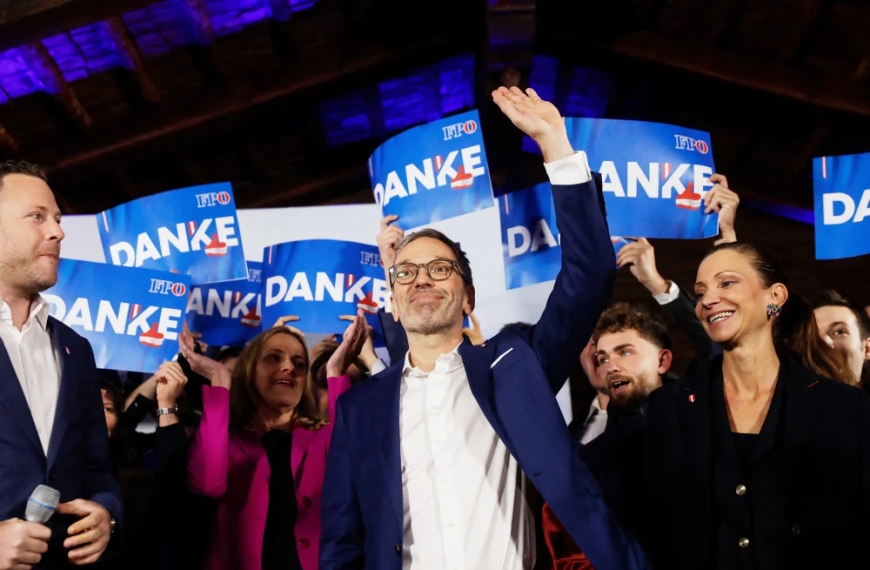Far Right Surges in Europe: Election in Austria and Increasing Danger to Liberal Democracy

With Austria's recent national election where the Freedom Party of Austria (FPÖ) claimed a historic triumph, Europe's far right has confirmed its position in the political mainstream. Originally a marginal party with Nazi connections, Herbert Kickl's FPÖ came in with almost 29% of the vote, surpassing the governing conservatives This victory fits a larger European pattern whereby far-right populist parties have achieved notable political gains riding on a strong mix of anti-immigrant attitude, economic worry, and mounting mistrust in liberal democratic institutions.
The election of Austria is merely the most recent illustration of the momentum of the far right over the continent. Rising in France, the Netherlands, Germany, and Italy, similar groups have stoked questions about the political scene of Europe going forward. Many of these organizations have a common platform reflecting the rhetoric of U.S. former President Donald Trump: authoritarianism, populism, and a strong anti-immigrant attitude.
Roots of the Far-Right Resurgence
Though it is not a new occurrence, the fast expansion of Europe's far right over the past ten years is remarkable. Political experts credit two major reasons for this increase: the global financial crisis of 2007–08 and the flow of migration into Europe driven by Middle Eastern and North African strife. Many Europeans were disillusioned by the financial crisis and struggled with growing inequality, failing public services, and stagnate pay. Fuel for the fire came from the 2015 refugee crisis, which brought millions of migrants—many from countries with majority Muslims.
The unexpected flood of migrants gave far-right groups rich ground to exploit concerns of cultural and demographic change in nations already struggling economically. Voters have typically gravitated toward more extreme political choices in response to this pattern—economic difficulty mixed with anti-immigrant rhetoric. A research in Electoral Studies claims that immigration surges during recessionary times often drive people toward far-right parties, who present immigrants as the scapegoat for unemployment and falling living conditions.
The "Ethnic Replacement" Thought Framework
The concept of "ethnic replacement," the assumption that immigrants—especially from countries with a majority of Muslims—are engulfing European civilizations, runs throughout all of these far-right movements. Platforms of people like France's Marine Le Pen, the leader of the Dutch Party for Freedom Geert Wilders, and Germany's Alternative for Germany (AfD have centered this philosophy. These groups present themselves as guardians of national identity, contending that immigration endangers Christian and humanist values of Europe.
Vocal opponent of Islam, Wilders has made provocative comments include suggesting a tax on headscarves and characterizing Islam as "the ideology of a retarded culture" Le Pen, who has lately tried to change her image, has been unambiguous in her criticism of what she regards as the "Islamist invasion" of France. With its leader Björn Höcke found guilty this year of employing a Nazi slogan at a rally, the AfD has taken a similar posture in Germany, underscoring the far right's perilous flirting with extreme ideas.
These parties nonetheless find popularity despite their divisive language. Though mainstream parties try to separate themselves, Germany's AfD is polling second and France's National Rally is still a potent force suggesting that a sizable section of the voters are ready to accept far-right policies.
Mainstream Change to the Right
The emergence of the extreme right is not only changing the political scene of Europe but also dragging mainstream parties toward more strict immigration and national identity policies. For example, the usually center-left Labour Party in Britain took a stricter position on immigration in the July elections, a strategy perceived by some as an attempt to offset the emergence of nationalist feeling. Even among those who assert to oppose the extreme right, this turn towards "patriotic" and anti-immigrant language shows the increasing impact of the far right.
Political academics such as Cas Mudde and Matthijs Rooduijn contend that the emergence of the extreme right is not a passing fad but rather a permanent aspect of European politics. Once considered as fringe, their policies are now somewhat mainstream and their impact is changing national as well as European Union politics. Already challenging the EU's liberal democratic standards are the emergence of far-right administrations in Italy and Hungary.
ramifications for democracy
The far right's increasing influence poses a serious threat to the liberal democratic values of Europe going forward. These groups sometimes promote splits in society by supporting protectionist economic policies and limitations on civil liberties, therefore undermining their own values. Their success highlights a more general dilemma in Western democracies whereby populist movements appeal to general dissatisfaction with the political system.
Many of these groups, notably Austria's FPÖ, have also been charged with harboring sympathies for authoritarian governments like Russia run under Vladimir Putin. Their mistrust of global alliances like NATO and their resistance to helping Ukraine in the conflict against Russia underline even more the geopolitical consequences of their ascent.
Far-right parties are probably going to keep acquiring ground as Europe struggles with demographic changes, economic stagnation, and the continuous consequences of globalization. Although they assert to defend the interests of their "indigenous" populations, their vision of a more homogeneous, inward-looking Europe seriously jeopardizes the multicultural and democratic traditions of the continent.
The challenge facing Europe's mainstream political leaders in the face of these escalating dangers will be to solve the social and economic issues driving far-right populism while maintaining the democratic and inclusive principles that define post-war Europe.













































